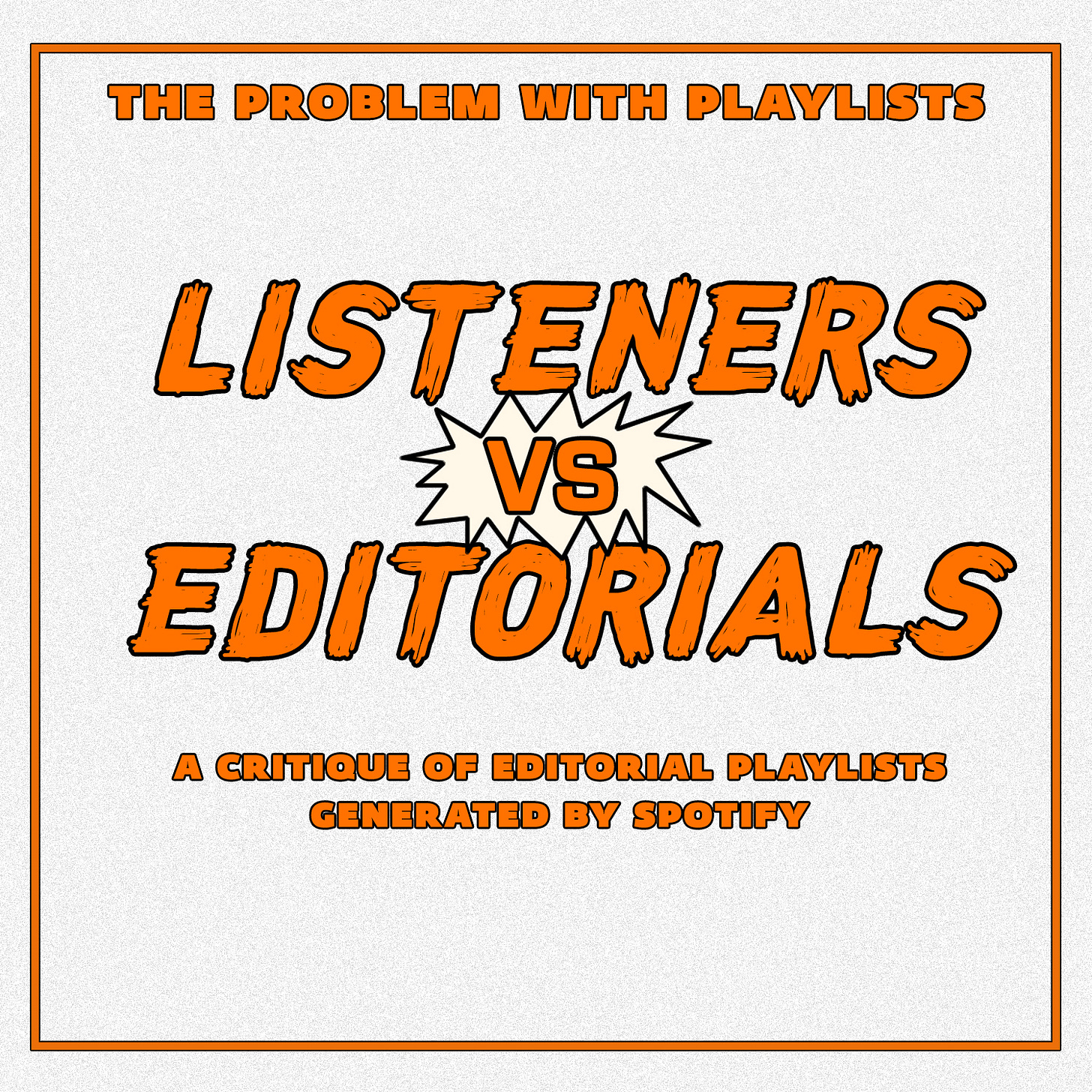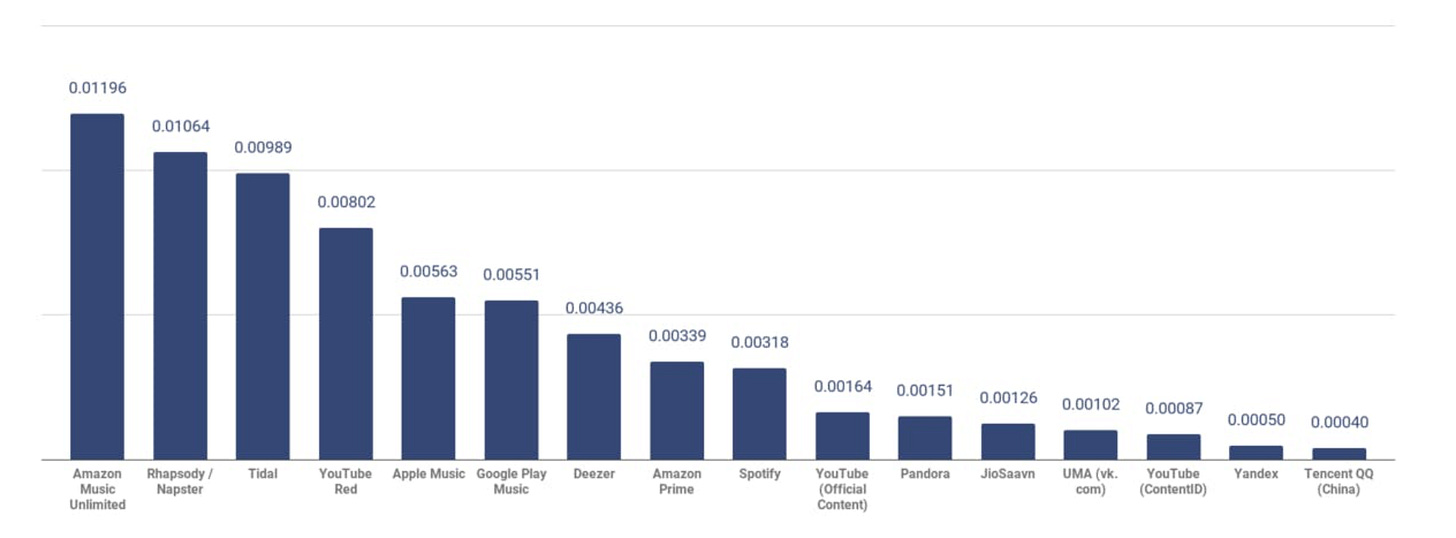The Problem with Playlists
How editorial curators aid in the gentrification of Hip-Hop production.

Before we get down to it, I want to set a clear precedent; Editorial playlists are on review here. User-generated playlists definitely help in providing a more intimate experience for listeners to truly find artists that they may end up listening to for a lifetime.
So don’t worry; your personal playlists are safe in this space.
When I reference playlists as being problematic, it mainly comes as a critique of the culture within’ corporate workplaces. Streaming services have undoubtedly made a difference in how the music industry operates and how fans support their favorite musicians on a daily basis: One of the primary differences being a growing concern with how many streams you can amass through platforms like Spotify, Apple Music, Tidal, etc. The pursuit of moving physical copies and units has converted over into a digital space, where plays are of primary concern and even obsession.
The newfound pursuit for streams has become a topic of discussion amongst many producer circles. With the exception of a few who’ve been able to carve out larger cult followings (i.e. Madlib, Knxwledge, Flying Lotus, TOKiMONSTA, to name a few), there’s still a widely held sentiment that many producers continue to battle in the industry: Beats without a vocalist really don’t deserve widespread coverage.
Enter playlist culture; editorial playlists created by team members working for these streaming services help to essentially give artists a guaranteed source of revenue and worldwide reach. With how streaming service payouts are structured, one could see the impact of being included in a playlist that reaches hundreds of thousands of listeners.

Pay-per-stream breakdown by music streaming services (in $), Source: Soundcharts
Many are already aware of these metrics, but to some it comes as a shock for the fact that per-stream payouts are extraordinarily low in comparison to what most of these companies make annually. Coupled with this, there’s currently a shift in that paradigm where there’s a growing sentiment in using Bandcamp, supporting artists in a much more direct way (as streaming revenue usually can take months to collect for withdrawal, depending on your chosen distributor). However, my focus is on the company that has garnered millions of users through its intuitive algorithms and helped to foster a generation of playlist placement driven producers: Spotify.
Keeping in theme with dissecting ‘Lofi’ in regards to its relationship with Hip-Hop, I spent some time listening to the Lo-fi Beats playlist curated by Spotify, and from that time I gathered a couple of conclusions: There’s definitely a recurring sound that many tracks have in common, much of the production included serves well as background music, and there seems to be a large following for the sounds provided, the playlist boasting over 3,000,000+ followers. I don’t doubt that there’s a benefit to artists by being added to these kinds of playlists, as music is a primary occupation for many and the revenue generated can help in a variety of ways. My critique is of Spotify and streaming platforms that aid in the gentrification of a genre through implicit restrictions to creativity, lack of black representation at smaller levels, as well as creating a class of ‘fly by night’ beat makers.
We’ve all been made aware that lofi is typically hinged on the practice of simplicity & minimalist production. Many beats have been created with a ‘less is more’ mindset and have come out wonderfully. The problem arises when simplicity turns into a bland, easily replicated recipe that deters an artist from innovation. If placements have become a certifiable stream of revenue, but curators are confining those slots to those creating ‘cookie-cutter’ beats, then we start to see an influx in one dimensional appropriation. Much of the practices instituted by lofi producers comes from those who deserve bouquets being tossed in their name, yet aren’t being given the same spotlight as opportunists that are only a few months deep into producing: Producers like Ohbliv, Stlndrms, OBUXUM, JWORDS, Teebs, Nothing_Neue, Suzi Analogue, P.U.D.G.E, & Paze Infinite (to name a small few) have been taking Hip-Hop production to new heights, even doing extraordinary work in cross-breeding it with a multitude of genres, yet there’s still a lack of visibility that seems to be aided and abetted by streaming platforms.
Playlist culture has created another troubling enclave within’ a black safe space. Some White producers enter through the doors of Hip-Hop into a sub-genre that continues to fail in educating those on the foundation/history of what they’re creating. Instituting a ‘low risk, high reward’ model, editorial curators have planted that seed into many producers (and soon-to-be producers) that ‘Lofi Hip-Hop’ is a fast track to income, as well as assumed worldwide appeal. Getting a track featured on a playlist can be partially exciting, but many fail to see drawbacks that can occur in conjunction with a playlist placement. Some producers will see a placement as a sign to keep making more of the same, offering little in the way of experimentation because if they deviate from the script, curators won’t include them in the next rotation. Compounded with this, when followers of the playlist hear your music come on, how likely are you to convert them into dedicated listeners? You can have over a million monthly listeners for a couple months with that playlist slot, but as soon as you’re rotated out, how sharp of a decline do those numbers take? Are listeners actively concerned with whose up next in their music queue, or are they just simply seeking background noise to study to? In some cases, creating a personalized experience & relationship with fans has gone out the window, and creating an assembly line of beats for careless consumption has been the goal.
Each artist is a case by case basis, but the editorial playlist culture has effectively helped in furthering a sense of complacency for profit. It’s one of many instances where Black artistry is pushed aside in favor of white-washed narratives, in a space that is BLACK in origin. Interpersonal connection between artist and fan, as well as an acknowledgement of Hip-Hop being a black house is treated with utter disregard, shown by the lack of black representation on smaller levels. While some would argue there are plenty of other editorial playlists that put black artists at the helm (i.e. Rap Caviar, Are & Be, African Heat) that’s not an excuse to then allow a lack of inclusivity in other arenas, when black hands are involved in touching virtually every other genre and every part of the music process.
Black artists continuously fight for recognition in spaces where white artists are given a spotlight with minimal effort. Speaking up on these disparities is absolutely necessary, because if it’s happening on a microscopic level, the thought is that we can easily be erased and that’s a sentiment we can no longer be willing to tolerate.




Great read! Playlist are very personal and editorial playlist are so filtered to say the least
Incredible read my dude. You're unstoppable.